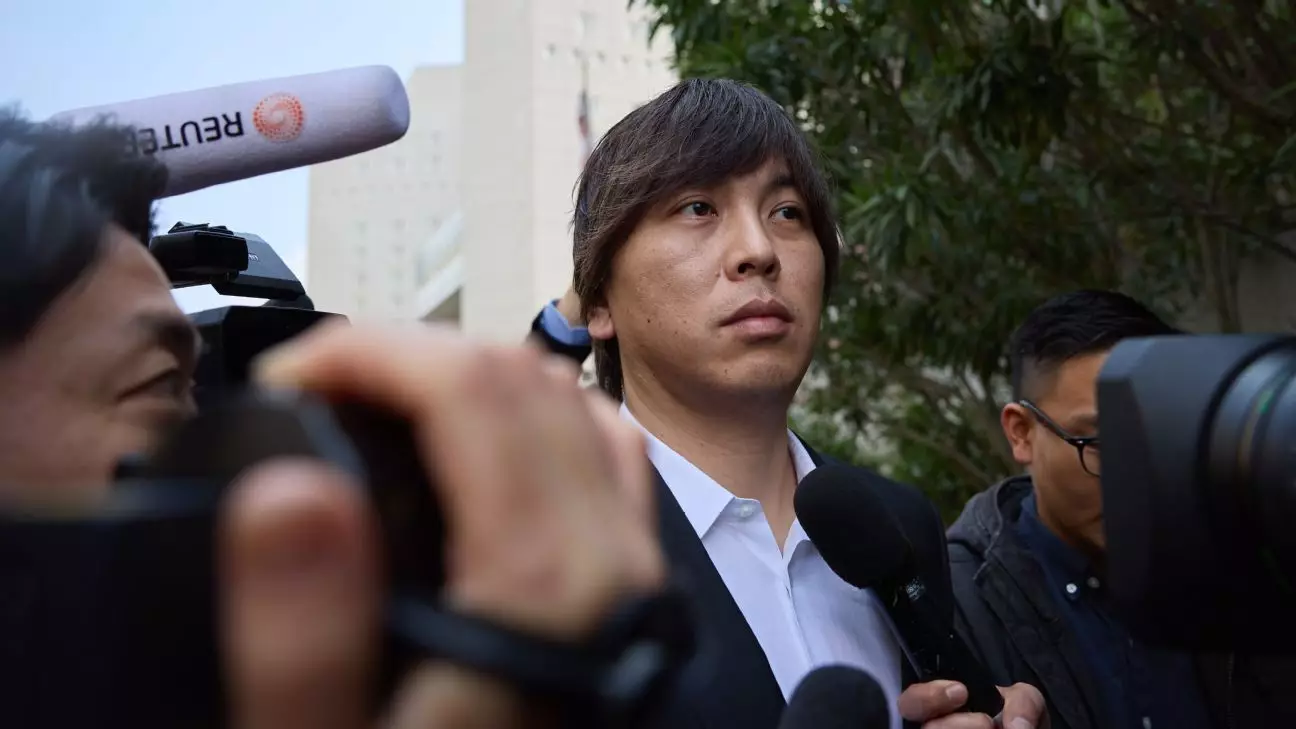In the glitzy realm of professional sports, loyalty and trust are paramount. For the Los Angeles Angels’ star, Shohei Ohtani, this notion was shattered when allegations surfaced regarding the actions of his former interpreter, Ippei Mizuhara. Once a trusted assistant, Mizuhara now faces an uphill battle against federal prosecutors who accuse him of pilfering millions from Ohtani to cover his gambling extravagances. As the legal drama unfolds, questions spring forth regarding the truth behind Mizuhara’s actions and the implications of his choices.
In recent court documents, federal prosecutors have sharply refuted Mizuhara’s assertions of a gambling addiction that allegedly propelled him to commit fraud. Mizuhara, who pleaded guilty in June, sought leniency in his sentencing, attributing his criminal behavior to what he termed a “long-standing” addiction. He claimed to have frequented casinos multiple times a week and cited remorse over his actions. However, prosecutors countered these claims, revealing a startling lack of evidence supporting Mizuhara’s statements.
Prosecutors conducted a thorough investigation across more than 30 casinos, which unearthed minimal gambling activity from Mizuhara—amounting to just $200 spent at the Mirage casino in 2008. This finding casts doubt on the narrative of a chronic gambling issue, suggesting that Mizuhara’s familiar defense of addiction may have been employed as a mere tactic to elicit sympathy and diminish his culpability.
A Closer Look at Financial Misconduct
Mizuhara’s fraudulent activities date back to September 2021, when he initiated a wire transfer of $40,000 from Ohtani’s account. Surprisingly enough, at that moment, Mizuhara had over $34,000 of his own money in his checking account. Prosecutors argue that he had the financial means to settle his alleged gambling debts without resorting to theft from Ohtani, highlighting a premeditated choice to exploit the athlete’s trust rather than an act of desperation.
Furthermore, Mizuhara’s claims of financial hardship, including paying hefty rent in Newport Beach while supposedly struggling financially, also fell flat. Prosecutors presented bank statements revealing that Mizuhara employed Ohtani’s debit card for rent payments without the player’s knowledge. This level of deceit only exacerbates the betrayal felt by Ohtani and raises profound questions about Mizuhara’s character and intentions.
Questionable Remorse and Legal Ramifications
In the realm of criminal justice, assertions of remorse often weigh heavily in sentencing decisions. However, prosecutors have characterized Mizuhara’s expressions of regret as insincere, suggesting that they may be motivated more by a desire to mitigate punishment than by genuine contrition. Legal experts have pointed out that he now faces not only a potential prison sentence but also a hefty restitution bill, which includes over $16 million owed to Ohtani and $1.1 million to the IRS.
Mizuhara’s attorney’s silence on the matter only fuels the speculation surrounding their strategy for the upcoming sentencing hearing. With prosecutors advocating for a significant prison term of 57 months, the weight of evidence and the severity of the case creates a challenging position for Mizuhara, who must navigate the complexities of legal consequences stemming from his choices.
The ramifications of Mizuhara’s misconduct extend beyond the legal realm; they cast a shadow over the integrity of relationships between athletes and their support staff. Trust is crucial in an industry where collaboration and communication are key to success. Mizuhara’s actions not only jeopardized his relationship with Ohtani, but they also highlighted the vulnerability of athletes who place blind faith in those they rely upon. This incident serves as a cautionary tale, reminding professional sports organizations about the importance of thorough vetting and oversight of personnel involved in athletes’ lives.
Ippei Mizuhara’s story is one that encapsulates themes of betrayal, deception, and the dire consequences of poor choices. As he faces a future marked by legal repercussions and the scrutiny of public opinion, the case stands as a solemn reminder of the thin line between trust and betrayal. With his sentencing set for February 6, the sports world continues to grapple with the fallout of Mizuhara’s actions and the ensuing questions about the integrity of those who operate in the shadows of athletic excellence. In the end, it is hope that justice prevails, leaving the legacy of this incident as a stern warning for all in the field.

